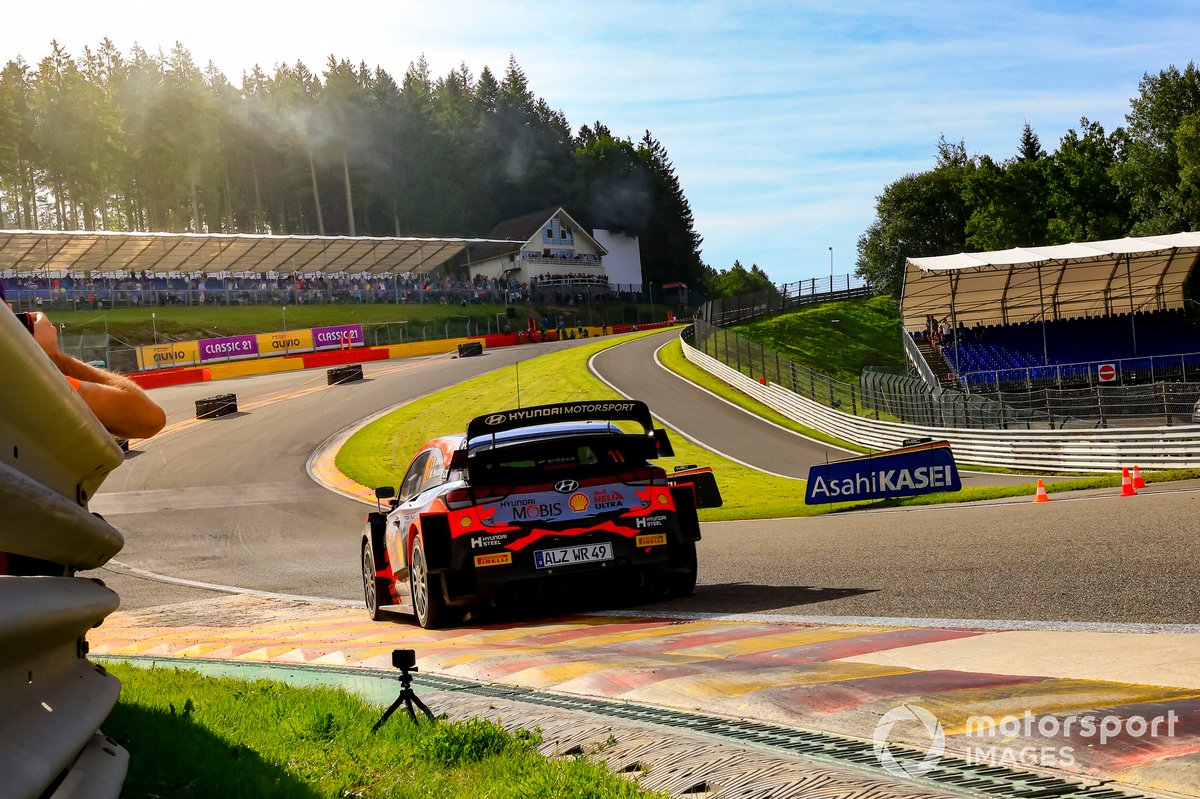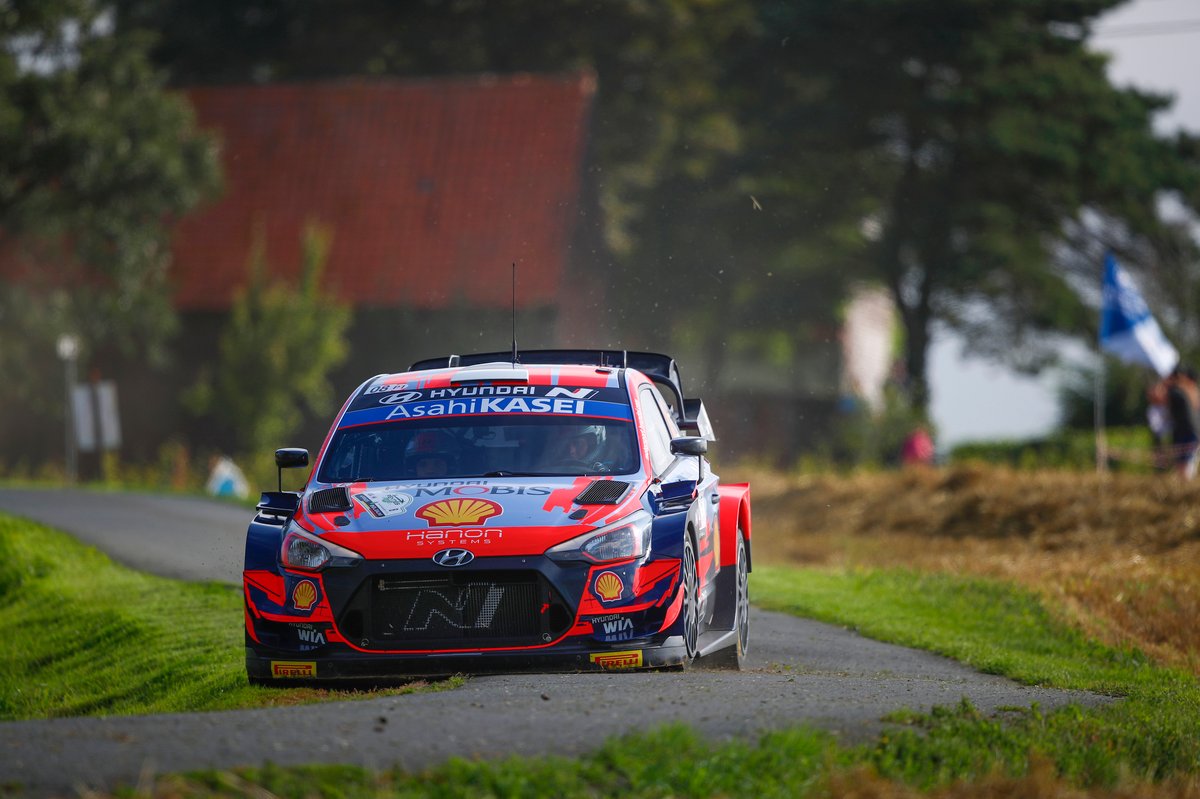
Rovanpera heads to Belgium with a commanding 94-point lead over nearest rival Ott Tanak, after finishing second behind the Hyundai driver at Rally Finland two weeks ago, which lifted the 2019 world champion into second in the drivers’ standings.
However, if Rovanpera is to become the youngest ever world rally champion in Belgium he will need to win the rally and for the Hyundai pair of Tanak and hot rally favourite Thierry Neuville to hit trouble.
If Rovanpera can extend his championship lead to 121 points, the 21-year-old will secure the championship with four rounds remaining.
For example, should Rovanpera win the rally and the power stage, he would need Tanak to finish ninth overall and fifth on the power stage, while Neuville, who is a point behind Tanak in the championship, would have to finish eighth and fifth on the power stage.
Rovanpera finished last year’s Ypres Rally in third, some 43.1s behind eventual winner Neuville. Rovanpera has however already enjoyed success on tarmac this year with victory at Rally Croatia in April.
Neuville is expected to lead the running on local roads he has conquered twice before in 2018 and 2021. Breen is tipped to lead M-Sport’s charge having won the event in 2019 before finishing second behind Neuville, while driving for Hyundai last year.

What is Rally Belgium?
Ypres Rally Belgium has become a revered European tarmac rally steeped in history since its inaugural event in 1965.
The rally comprises fast, narrow and twisty asphalt country roads punctuated by tight junctions that are lined by treacherous drainage ditches.
The event has become a mainstay in the European Rally Championship, while also becoming a fixture in the Belgian and British national championships, and the now defunct Intercontinental Rally Challenge.
Last year the rally joined the WRC for the first time with the round acting as a replacement for Rally Northern Ireland, after organisers were unable to secure the required funding.
Rally Belgium winners
Ypres Rally Belgium has been dominated by local drivers over the years with 39 of the 56 editions being won by a Belgian driver.
Former factory WRC driver Freddy Loix has been the most prolific, scoring a record 11 wins (1996-1999, 2008, 2010-2011, 2013-2016).
Previous winners include two-time world champion Walter Rohrl in 1976 and the late Henri Toivonen (1984). Jimmy McRae, Tony Pond and Kris Meeke are among the Brits to enjoy success, while Ireland’s Craig Breen triumphed in 2019.
Hyundai’s Thierry Neuville has won the rally twice with his last win in 2021, arriving on the event’s full WRC debut.

Rally Belgium itinerary
This year’s edition will be contested over 20 stages, comprising 281.58km across three days of competitive action.
Thursday 18 August
Shakedown - begins 1501 BST - 1601 local
Friday 19 August (8 stages - 97.02km)
Stage 1 - Stage 8 - begins 0916 BST - 1016 local
Saturday 20 August (8 stages - 133.22km)
Stage 9 - Stage 16 - begins 0913 BST - 1013 local
Sunday 21 August (4 stages - 43.92km)
Stage 17 - Stage 20 - Final stage begins 1218 BST - 1318 local
Rally Belgium Entry List (Rally1) - Road order
Rally Belgium will feature 88 entries headlined by 10 Rally1 cars.
#69 Kalle Rovanpera/Jonne Halttunen - Toyota Gazoo Racing - GR Yaris Rally1
#8 Ott Tanak/Martin Jarveoja - Hyundai Motorsport - i20 N Rally1
#11 Thierry Neuville/Martijn Wydaeghe - Hyundai Motorsport - i20 N Rally1
#33 Elfyn Evans/Scott Martin - Toyota Gazoo Racing - GR Yaris Rally1
#18 Takamoto Katsuta/Aaron Johnston - Toyota Gazoo Racing - GR Yaris Rally1
#42 Craig Breen/Paul Nagle - M-Sport Ford World Rally Team - Puma Rally1
#4 Esapekka Lappi/Janne Ferm- Toyota Gazoo Racing - GR Yaris Rally1
#44 Gus Greensmith/Jonas Andersson - M-Sport Ford World Rally Team - Puma Rally1
#2 Oliver Solberg/Elliott Edmondson - Hyundai Motorsport - i20 N Rally1
#16 Adrien Fourmaux/Alexandre Coria - M-Sport Ford World Rally Team - Puma Rally1
The field also includes four-time world champion Juha Kankkunen, who will pilot a hydrogen powered GR Yaris on one stage during each competition day.
Former Formula 1 driver Jos Verstappen is set to make his WRC debut, competing in a Rally2 specification Citroen C3.

What’s new for WRC in 2022?
This year sis the introduction of new Rally1 regulations designed to move the WRC into a much more sustainable future and to attract new manufacturers. They have resulted in Hyundai, Toyota and M-Sport Ford designing and building all-new cars around a new safer, steel spaceframe chassis.
The biggest change to the cars is the introduction of a mandatory 100kW hybrid unit coupled to the 1.6-litre turbocharged internal combustion engine, the only key component carried over from the previous generation of cars. In tandem, this will allow the powertrain to develop 500bhp to be used in short bursts across every stage.
Cars will be up 70kg heavier than their predecessors, this is mainly due to the addition of the hybrid system. In total, Rally1 machines will weigh in at approximately 1260kg.
The new regulations have effectively abolished extra aerodynamic devices such as wings and flicks being added to the bodywork outside of the front splitter and rear wing. The overall downforce created and its effect on the car has been reduced by approximately 15% compared to the previous generation of vehicle.
Trick centre differentials used to fine tune handling are now banned in favour of a simpler front and rear mechanical limited-slip differentials offering a fixed 50:50 toque split between the front and rear wheels. Suspension travel has been reduced to 270mm.
How does the Rally1 hybrid system work?
Drivers will have the use hybrid power during every stage, with power boosts activated by the throttle pedal, while further boosts will be unlocked through energy regeneration under braking during stages.
Pilots will be required to regenerate 30 kilojoules of energy before another boost is granted that will be used the next time they touch the throttle pedal.
The extra 130 horsepower is delivered through the use of three bespoke homologated engine maps selected by teams, depending on the type of stage and conditions.
Determined by the FIA and event organisers, drivers will be required to navigate parts of road sections and around event service parks in full electric mode.
In full electric mode the car has a range of 20km, while its 3.9KWH battery, operating up to 750 volts, can be plugged in and recharged in the service park within 30 minutes. The hybrid unit can withstand an impact of 70G.
The cars are powered by a 100% sustainable fuel.

How can I follow Rally Belgium?
Autosport/Motorsport.com will be providing reports, interviews and reaction.
Motorsport.tv will also have regular highlights both during and after each WRC round in 2022.
Pay television
WRC Plus All Live will provide live coverage from every stage.
BT Sport will live action and provide daily highlights shows from every event this season.
Free to air television UK
ITV4 will broadcast highlights on Tuesday 23 August.








